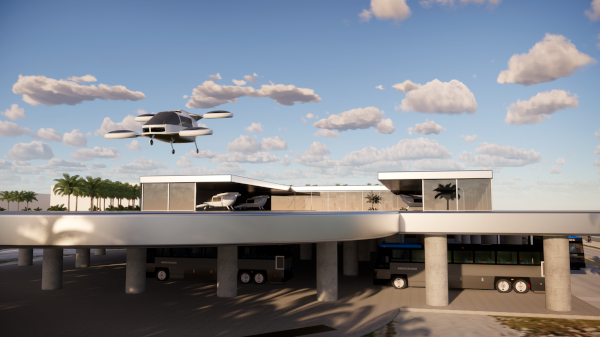
Around the 120th anniversary of the Wright brothers’ first flight, the aviation industry is now witnessing a new revolution in air travel.
Electric vertical takeoff and landing aircrafts (eVTOLs)—aka flying cars or air taxis—have performed their first public flight demonstrations in New York and Los Angeles and are ready to usher in the next era of urban mobility.
Let’s review the latest milestones and see how this exciting new industry continues to advance in leaps and bounds.
Navigating the Safety Certification Process
In October 2023, the Chinese company E-Hang obtained certification from the Civil Aviation Administration of China (CAAC) for its EH216-S model, making China the first country to allow an eVTOL aircraft to operate commercial transportation and tourism routes.
This marks an important milestone for the industry, but certification in the United States, Europe, and the United Kingdom is expected to take a bit longer.
The US Federal Aviation Administration (FAA), the European Aviation Safety Agency (EASA), and the UK Civil Aviation Authority (CAA), which all work together, are more restrictive and require more vigorous safety testing and compliance for aircraft to earn their airworthiness certificate.
At this point, it’s only a matter of time before eVTOLs are cleared to fly in the US and Europe. Several models from different companies are already advancing through the various stages of the certification process, with frontrunners preparing for certification as early as 2025.
High-Volume Manufacturing of eVTOLs
There is big buzz around certification, and it is indeed a key milestone, but it is far from the end target. High-volume production and on-time delivery of the aircraft to the different airlines and markets is the only way for the eVTOL business model to work.
Two of the American companies expected to hit the market first are Joby and Archer. They are progressing the fastest in terms of flight testing and certification, with expected entry into service in 2025. Furthermore, they are both backed by automotive companies to help with supply chains and mass manufacturing.
Joby is backed by Toyota, while Archer is backed by Stellantis (owner of Chrysler, Dodge, Fiat, Jeep, and Maserati, among others). Both Joby and Archer have already acquired locations to establish their factories in the US (Dayton, Ohio and Covington, Georgia respectively), further illustrating their business readiness.
Airlines and Early Adopters
And the orders are already piling up. Airlines like Delta, United, American Airlines, and other companies including Blade Helicopters and UPS have placed tentative advance orders for hundreds of eVTOLs. A Brazilian company called Eve Air Mobility (founded by Embraer) is leading the pack with 2,850 orders in their pipeline.
It is also expected to see individual private eVTOL ownership by clients used to traveling by helicopter. Lilium has its sights set on this affluent market and aims to attract high-income customers in Austin, Houston, San Antonio, and Dallas (Texas) with its futuristic and unique Lilium Pioneer Edition Jet eVTOL.
However, a key objective is to democratize prices to make eVTOLs accessible for everyone and competitive against polluting and congestion creating modes of ground transportation, like cars.

The Battery Challenge: Creating a Circular Economy for Batteries
Battery technology is improving with time and yet more, some early developments can already be seen in the area of solid-state batteries. Although eVTOLs are all about full electric technology, it’s important to note that eVTOLs and other electric vehicles are not 100% green. The industry still needs to figure out how to create a circular economy where batteries can be reused or recycled.
Just as they work to develop new types of batteries and chemical mixtures, and explore alternative sources of energy, no matter how powerful or how advanced batteries may become, the challenge of what to do with them after their useful lifetime remains to be faced.
Working Together Toward Standardization
In every industry, there is always someone who wants to be the outlier and take its own path, ignoring the standardization efforts. With smartphones, it’s Apple. With electric cars, it’s Tesla. And with eVTOLs, it’s yet to be seen who takes on that role.
Still, the global intention is to get as much standardization as possible by communicating and working together with different eVTOL manufacturers, airline operators, and other developers. This is key to ensuring quick aircraft turnarounds and a better operator and passenger experience.
Regarding eVTOL chargers, the assumption in the industry so far is that the Combined Charging System (CCS) will be the global standard for charging, at least until the Megawatt Charging System (MCS) standard arrives on the scene.
Given that the preference (due to safety and energy savings reasons) is for eVTOLs not to taxi on ground under their own power, infrastructure needs to develop standardized electric towing vehicles to grab the eVTOLs and carry them between locations for boarding, take-off, landing, and charging.
To design a grabbing mechanism that can interface with eVTOLs of all different shapes, sizes and landing gear configurations, there must be an open, collaborative environment to create synergies and find common ground.
This can be challenging in the early stages of new technology development, as there is a tendency toward secrecy and confidentiality. Fortunately, eVTOLs are now stepping out in the spotlight.
Public Flight Demonstrations in California and New York
Until now, all eVTOL manufacturers have been test flying their aircraft in different locations, but always with a high degree of secrecy.
In October 2023, Wisk became the first eVTOL company to publicly fly in Greater Los Angeles. They had previously flown publicly in July 2023 in Oshkosh, WI.
The wholly-owned subsidiary of Boeing flew their autonomous (self-flying) eVTOL aircraft in a public demonstration at Long Beach Airport during the city’s Festival of Light.
Less than one month later, on the opposite coast of the country, Joby and Volocopter became the first eVTOL companies to fly in New York City, also in a public exhibition. Volocopter had already flown publicly in 2019 at the Singapore Marina Bay.
Joby is partnering with Delta Air Lines in a plan to provide home-to-airport air taxi services to Delta customers in New York City and Los Angeles. Joby expects to fly from John F. Kennedy International Airport to Manhattan in just seven minutes, a journey that can take over an hour by car (or requires a very expensive helicopter ride).
These public flight demonstrations are just a taste of what is to come. It’s an exciting time in the world of air travel and urban transportation.
Putting Passengers First: Social Acceptance
Now that eVTOLs are flying into the public sphere and becoming a reality, it is time for the industry to listen to public´s feedback. Running surveys, bringing people into living labs, and creating early engagement becomes now an obligation, so people’s questions can be answered not only with words but also with experiences and demonstrations.
The eVTOL industry will revolve around the passengers and around achieving a fast and seamless end-to-end journey.
As the puzzle pieces of eVTOL development, safety certification, mass manufacturing, partnerships, and infrastructure keep falling into place, the passenger experience will light the way forward.





There are no comments yet